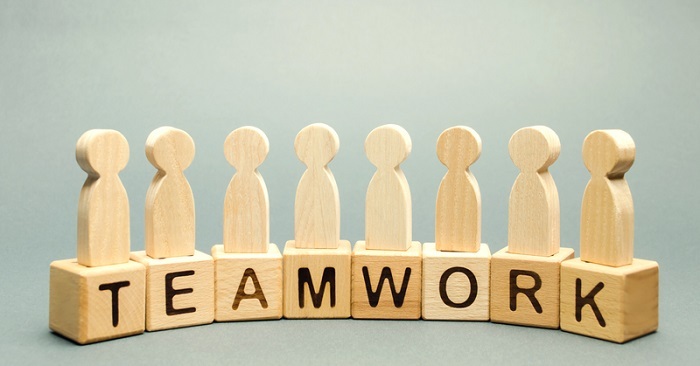
 Data Structure
Data Structure Networking
Networking RDBMS
RDBMS Operating System
Operating System Java
Java MS Excel
MS Excel iOS
iOS HTML
HTML CSS
CSS Android
Android Python
Python C Programming
C Programming C++
C++ C#
C# MongoDB
MongoDB MySQL
MySQL Javascript
Javascript PHP
PHP
- Selected Reading
- UPSC IAS Exams Notes
- Developer's Best Practices
- Questions and Answers
- Effective Resume Writing
- HR Interview Questions
- Computer Glossary
- Who is Who
Tips For Improving Project Team Collaboration and Productivity
We all agree that working as a team may be exciting and difficult. Still, we can accomplish amazing things when we pool our resources and brains. We've all been a member of teams with hazy objectives and imprecise job descriptions. Working in such a setting may be aggravating and demoralizing.
No matter how effective your team is, there are always methods to improve it and reach new heights of efficiency. But worry not; in this blog post, we will discuss the importance of project collaboration and how to improve team productivity.
Why are Team Collaboration and Productivity So Important?
Team collaboration and productivity are critical components of every successful project. Effective teamwork lets individuals pool their talents and perspectives to accomplish a shared objective. Collaboration enables team members to capitalize on each other's strengths and make up for each other's limitations, improving the effectiveness of decision-making and problem-solving processes.
Moreover, productivity is necessary for finishing a job successfully. Team members that are productive work quickly and skillfully to complete assignments and meet deadlines. Productivity enables the project team to complete its tasks within the allocated time and budget, which may increase customer satisfaction and provide larger financial gains for the company.
Collaboration and productivity boost team morale and work satisfaction. Team members are more likely to feel happy and interested in their work when they believe they are progressing toward a shared objective. The project and the company may eventually benefit from more motivation and better performance as a result of this.
How to Improve Team Collaboration and Productivity?

Assign Ownership to your Team Members
The most effective corporate executives are aware of the importance of ownership. Giving team members ownership only entails empowering them to take charge of their actions and holding them responsible for the results of those actions.
A team member responsible for his job develops a feeling of ownership. He begins to see his career differently, so his choices may affect the team's overall effectiveness.
Giving ownership may now take many other forms, such as taking charge of a project or task. It demonstrates that you have confidence in your team members' competence to handle a certain task. And as a result, you realize that nothing in your company is more effective than boosting someone's self-esteem.
Ensure Effective Communication
One of the key elements that significantly boost team efficiency is communication. Businesses fail without efficient communication. Since misunderstanding results from a lack of communication, which leads to many failures, Many successful firms depend heavily on good communication. Today, a project manager must guarantee that a team communicates effectively.
For team members to understand their work duties, communication is crucial. Also, any communication problems might cause several misunderstandings, which unquestionably affects the team's total productivity.
Be Transparent with your Team
Project transparency is another factor that decides whether you want to become an effective leader or just someone with a leadership title. There is no valid reason for you to keep any information from your team apart from sensitive and private information. Your team will work harder and feel more inspired to complete the project if they clearly understand the project's goals and where they are right now.
Communicate your Expectation for Collaboration
You cannot expect your staff to collaborate if they are unaware of your expectations. Set a minimum benchmark for the level of participation you anticipate. Better still, it should be included in your onboarding process to show prospective hires that you value cooperation.
Job descriptions for employees should include both their solitary responsibilities as well as any team-based responsibilities. By distinguishing between them, you're establishing boundaries between what they should be responsible for individually and what they should be working on collectively.
Encourage Participants who take the Initiative
Being the pioneer of a novel idea or method that deviates from accepted project management procedures is challenging. You must promote an innovative environment where team members are rewarded for taking the initiative to complete tasks quickly.
People like that are a plus for managers since they'll be the first to accept any novel modifications or new rules you implement enthusiastically.
Encourage a Collaborative work Atmosphere
Working environments that foster collaboration need a strong feeling of community. According to most employees, a strong sense of community encouraged them to stick with a firm longer than was in their best interests.
People are more inclined to put more effort into something when they believe their opinion counts. People feel redundant, and teamwork breaks down when they know their perspective is worthless.
Support Constructive Criticism
Teams whose members are encouraged to express their concerns about norms, practices, or behaviors that could be risky are teams with strong "prohibitive" team voices. Members of these teams aren't reluctant to point up possible dangers and hazards in the workplace.
For instance, members of these teams are encouraged to point out potentially dangerous shortcuts. These groups most likely have a stronger safety track record. These teams' members are more likely to follow safety rules, participate in more safety monitoring, and exert more effort to achieve security-related objectives.
Provide them with Space to Work
Every team member or employee performs at their best in an atmosphere where they are free to accomplish things "their way." Most workers tend to lose interest when their supervisors or employers micromanage them.
Building an awesome team is one of the numerous strategies that might assist you in overcoming this. Give them a detailed explanation of their work duties and your expectations. Give them their space so they can work independently right now. Be personable at the same time so that members of your team won't hesitate to ask questions when they have them. Always have complete faith in your staff. As a result, their self-confidence is increased, and they are better able to perform.
Allow Employees to take Breaks
Regular, brief breaks increase team productivity when they are properly planned. Employees need breaks to detach from their job, unwind, and recharge their batteries to avoid burnout.
Brief breaks from work should be strategically planned so that they don't distract you from the current activities. You may encourage your team members to employ the Pomodoro method, which calls for concentrated, uninterrupted work periods of 25 minutes, followed by five-minute breaks.
Enhance Office Meetings
It's time to switch things up if your regular meetings have been dull and something you dread. Longer than necessary sessions squander time and demotivate everyone. There must be a set agenda for your meetings that everyone must follow. Before the meetings, send out thorough project reports and progress updates. By doing this, you may avoid time-consuming status updates and ensure that every member is aware of the project's present state.
Conclusion
As we've seen, strong teamwork allows members to use each other's strengths, exchange information and skills, and make up for each other's limitations.
In general, there isn't just one approach to enable your teams to be more productive; instead, you may build the basis of a productive atmosphere through tiny, regular activities. In addition to fostering clear communication and ensuring everyone is on the same page, effective cooperation also helps avoid misunderstandings, delays, and redo work.

